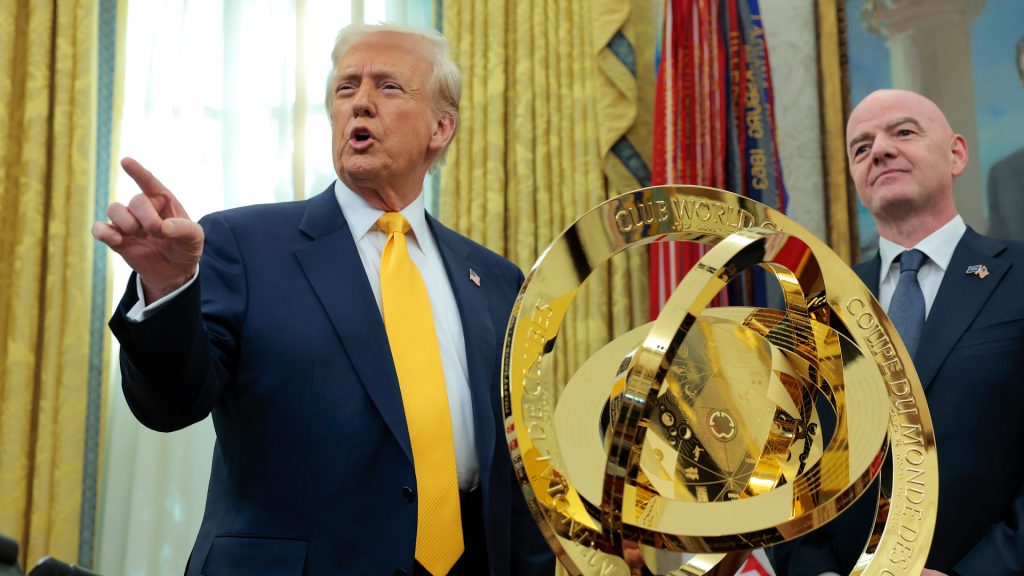Will the world of sports be affected by the global tariff war?
Ella Greene April 10, 2025 0
- The escalating tariff dispute between the U.S. and other countries around the world may soon impact the sports world. The tariffs could affect car parts, apparel and even sponsorships.
- NASCAR teams say they are watching developments on “a daily basis” as prices for parts increase.
- If the dispute continues on its current course, it could impact events like the 2026 World Cup and the 2028 Olympics.
Full Story
Sports is a big business. That means the tariff war between the U.S. and the rest of the world will eventually affect sports, too.
Are there already impacts?
Those effects may not be apparent to fans right away, but that could change quickly if things continue on their current path. On Wednesday, April 9, China announced a new 50% tariff on U.S. exports in response to tariffs by the U.S. on incoming goods. The economic conflict initiated by President Donald Trump has already caused sports teams and their business partners to adjust, but there are many unknowns.
Take the racing world. NASCAR, Formula 1 and IndyCar circuits all use mandatory single-sourced parts to regulate competition, many of which come from overseas.
Those parts include tires from BBS, a German manufacturer, chassis from Italy or brake systems from the U.K. Increased costs on these foreign parts will affect any team’s bottom line, especially those struggling to stay in the sport. NASCAR commissioner Steve Phelps was recently asked about it on the podcast “Hauler Talk.”
“It’s an unknown. I had a conversation with (NASCAR team owner) Rick Hendrick, and obviously his base business is affected by the tariffs,” Phelps said. “What that looks like for him, he doesn’t know, but you can bet he’s monitoring it on a daily basis. We’re doing the same.”
What about bigger events?
The 2026 World Cup, which will be held jointly in the U.S., Canada and Mexico, is directly in the crosshairs of the tariff dispute. Trump began the trade war by hitting Mexico and Canada with tariffs in late January. Those moves have caused tension between the three nations. Will things settle down enough to allow the countries to work together to host the world’s biggest sporting event in a little more than 14 months?
On March 8, Trump spoke alongside FIFA President Gianni Infantino as they established a task force to oversee tournament preparations. He spoke on if tensions would hinder the competition.
“I think it’s going to make it more exciting. Tension’s a good thing; I think it makes it much more exciting.” The president said.
The president may be referring to the NHL’s recent 4 Nations Face-Off held in February. The tournament skyrocketed in popularity and was heavily influenced by the recent tensions between the U.S. and Canada.
What about advertising?
Will the tariffs hurt businesses and sponsors who want to be involved in the World Cup? Hyundai is a major FIFA sponsor. Will they still spend advertising dollars in the U.S. during the World Cup if their cars sell less because of the tariffs? And although it is several years out, the same questions can be asked about the 2028 Olympics scheduled in Los Angeles.
Sports teams, in general, may start spending less on advertising and sponsorship deals if they have to tighten their belts because of the tariffs. New stadium projects could be delayed or put off as the price of steel and other construction materials rises. Not only that, but the majority of sports apparel, from the likes of Nike to Adidas, is made overseas. Those costs, currency fluctuations or fears of a recession will all affect how teams operate and what they spend in the near future.
Recession fears could affect ticket prices and merchandise sales at sports events. Right now, uncertainty is the name of the game, and the game has many question marks.
Related Stories
Ella Rae Greene, Editor In Chief
Ella Greene
Ella and the staff at Clear Media Project (CMP) curate these articles.
Unless otherwise noted CMP does not write these articles.
The views, thoughts, and opinions expressed in the articles published on this blog belong solely to the original authors and do not necessarily reflect the views of the blog owner. The blog owner does not claim ownership of the content shared by contributors and is not responsible for any inaccuracies, errors, or omissions.
All rights and credits goes to its rightful owners. No Copyright Infringement is intended. If you believe any content infringes on your rights, please contact us for review and potential removal.





